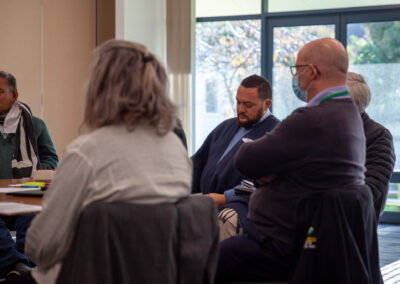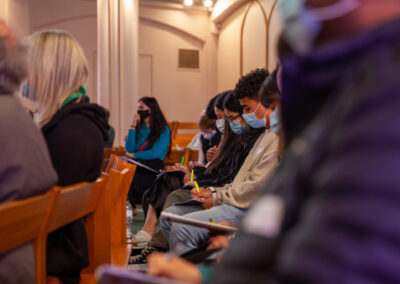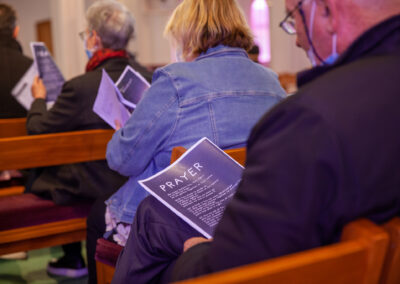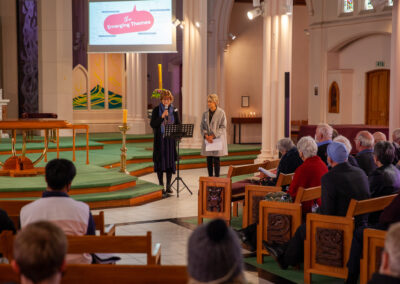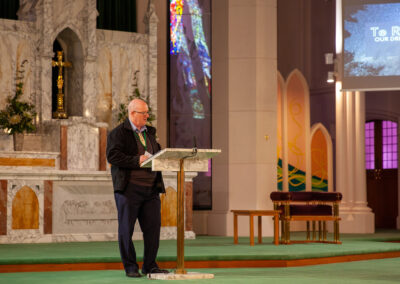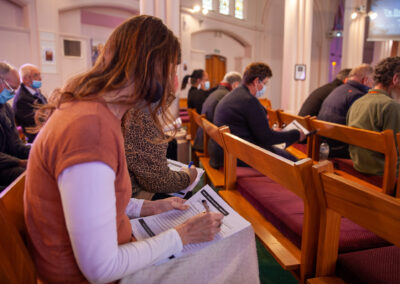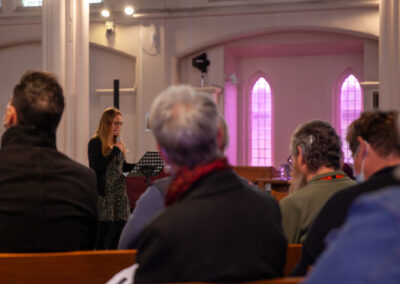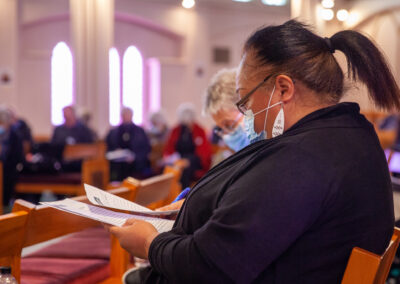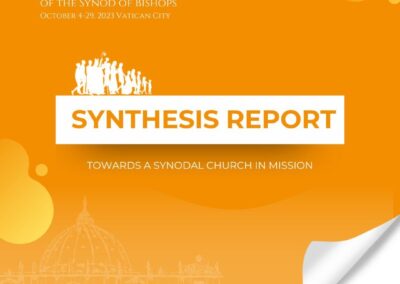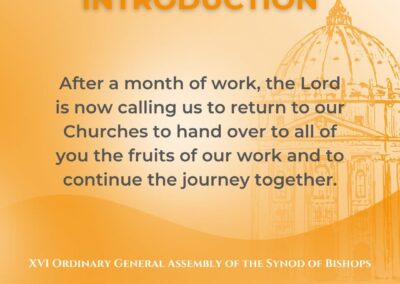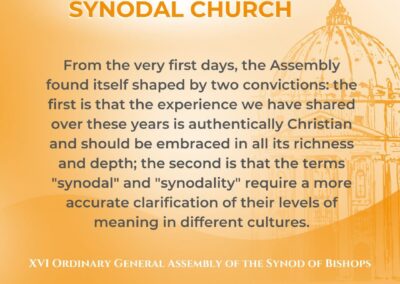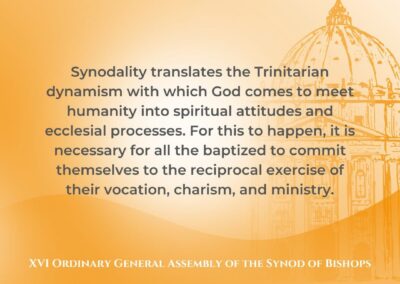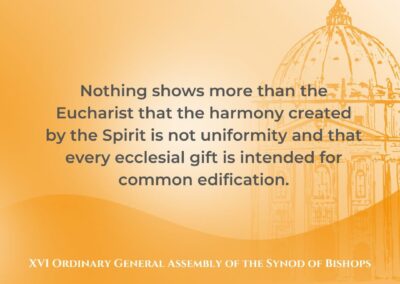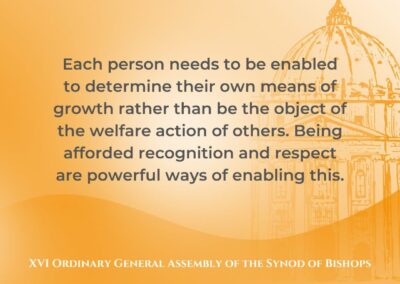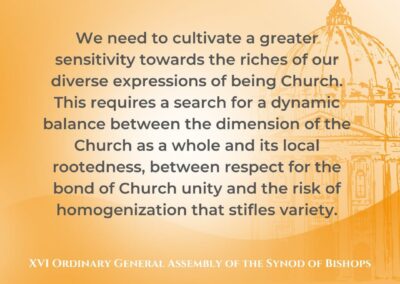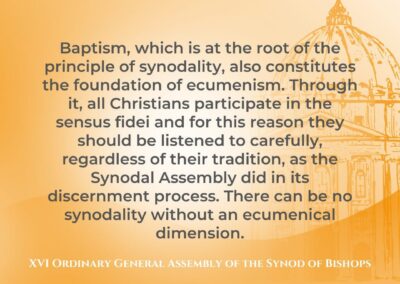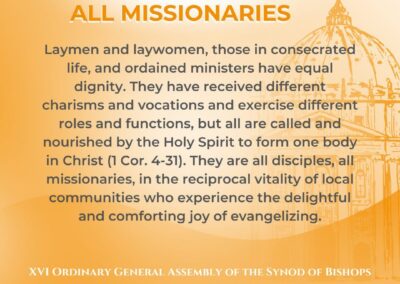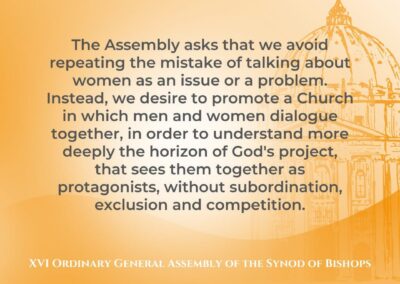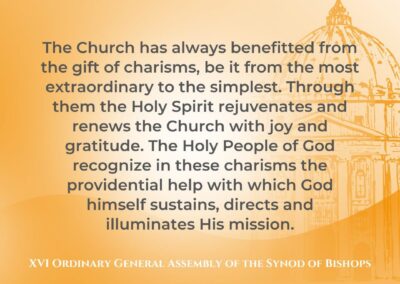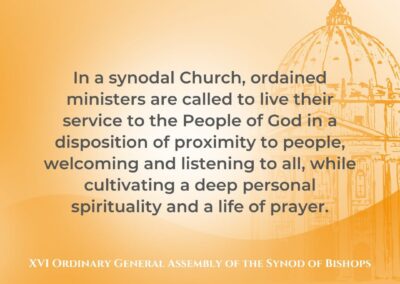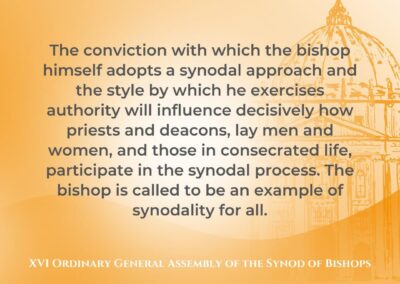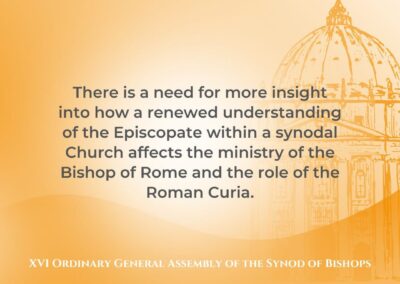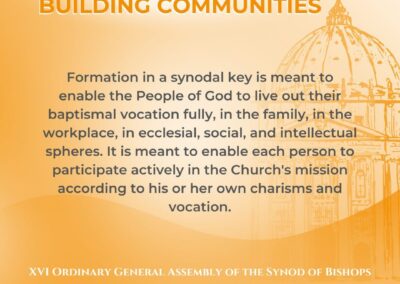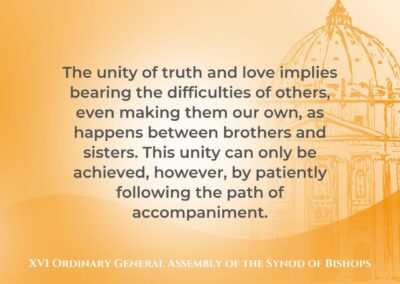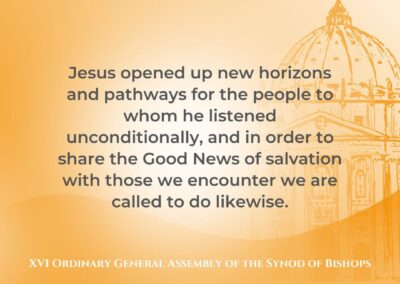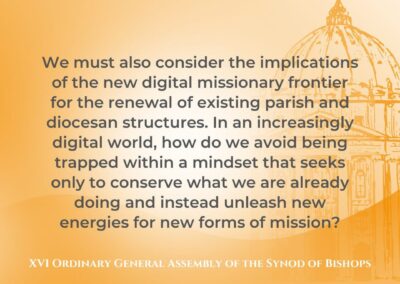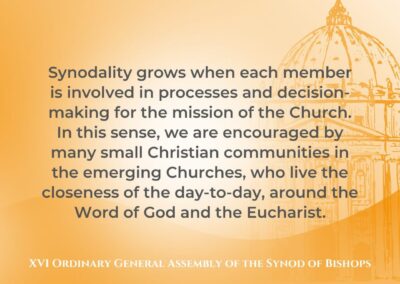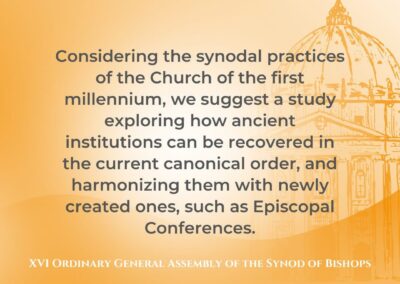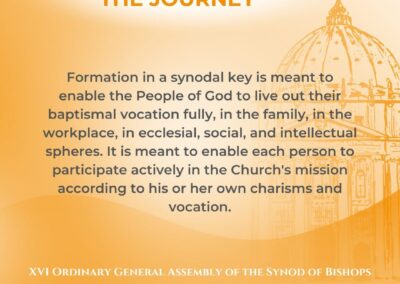The Synod on Synodality, initiated by Pope Francis in October 2021, embodies his vision for a more inclusive and participatory Catholic Church. This global, multi-year process engages all members of the Church in dialogue and discernment, emphasising the importance of listening to diverse voices, including those of laypeople, clergy, and marginalised groups.
Building on themes from previous synods, the process involves local consultations, continental assemblies, and a universal phase, culminating in a General Assembly in 2024. Its objectives are to promote a culture of synodality, address social justice issues, and foster pastoral conversion, reflecting a profound commitment to transforming the Church into a community that journeys together in faith and mission.
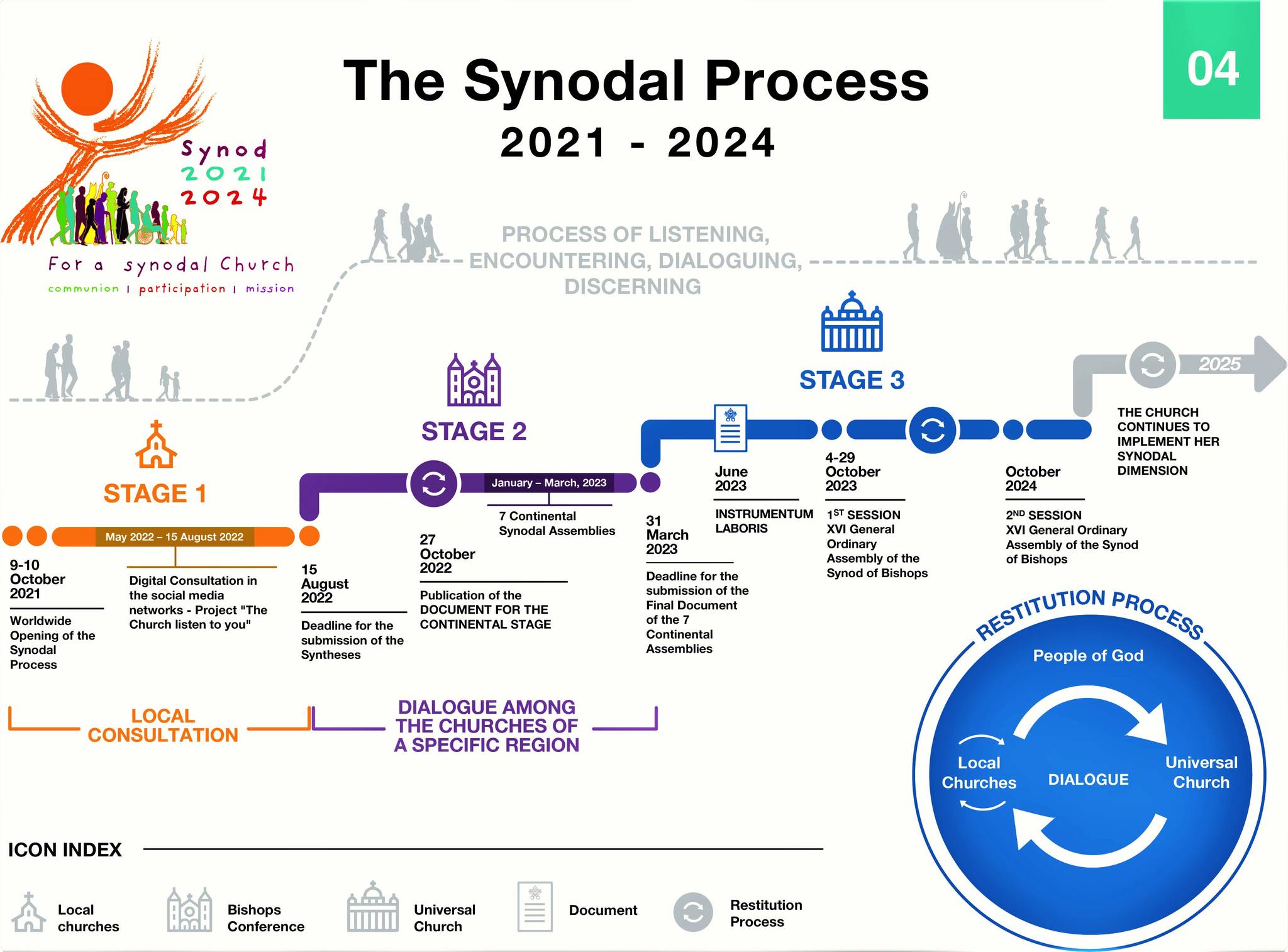
The Synod on Synodality has been progressing through its three phases: the local phase, the continental phase, and the universal phase. Each phase has involved extensive consultation and reflection among the faithful to address various aspects of synodality, communion, mission, and participation within the Church.
Local Phase (2021-2022)
The local phase began in October 2021 and involved consultations at the diocesan and parish levels. This phase focused on listening to the voices of all members of the Church, including laypeople, clergy, and those often marginalised. Each diocese was encouraged to engage in conversations about their experiences of Church life and how the Church can better journey together in faith. Key themes included the role of women in the Church, the inclusion of LGBTQ+ individuals, and addressing clerical sexual abuse.
Continental Phase (2022-2023)
The continental phase, which started in late 2022, aimed to synthesise the feedback from the local consultations and discern common themes and divergences across different regions. Continental assemblies were held, where representatives from various dioceses discussed the issues identified during the local phase. This phase highlighted the need for greater inclusivity and dialogue with people of different faiths and social contexts. Topics such as the ordination of women deacons, the role of the laity, and the Church’s mission in addressing social justice issues were prominent.
Universal Phase (2023-2024)
The universal phase includes two key synodal assemblies in Rome: one held in October 2023 and another scheduled for October 2024. During these assemblies, bishops and representatives from around the world gather to discuss findings from the previous phases and draft a final document. This phase focuses on concrete proposals for enhancing synodality within the Church. Key discussions include the Church’s stance on various social issues, improving liturgical practices to be more accessible and culturally relevant, and fostering ecumenical relationships with other Christian denominations.
STAGE ONE: LOCAL PHASE
This synthesis document is the culmination of communal spiritual discernment. It aims to express the fruits of the synodal process, indicating how the Holy Spirit’s call to the Church has been understood in the local context.
This synthesis document is the contribution of the Diocese of Palmerston North to the local phase of Synod 2021-2023. This document was published on 10 June 2022 and can be accessed below.

Te Reo o Hewa | Explanation of the name
From the peaks of Maungā (Mount) Ruapehu and rays of the rising sun, the name ‘Te Reo o Hewa’ was gifted to this synodal process and to the diocesan synthesis document.
This name was gifted following a gathering of families at Mihiroa Marae, in Pakipaki, for the Hinepuaraurangi Rā Wairua (a form of retreat). This gathering is connected to the Māori movement of Māramatanga, and has taken place in Pakipaki for 35 years. The Marae is where Māori can go to express every part of our being.
“The Rā is a day set aside to give thanks and share dreams and aspirations, and to help bring them to fruition. We pray, sing, dream, eat, and celebrate miha (mass), and five mokopuna (young people) were baptised. The hardest part of our Rā is that we have to say goodbye.”
This Rā is named after Hinepuaraurangi, which in Greek is the star called Atik, part of the Perseus constellation. There is a smaller cluster surrounding this constellation that is called Te Paki o Hewa/Te Paki o Hiwa.
Hewa/Hiwa help us form our dreams and aspirations and it is the star Hinepuaraurangi/Atik who brings these dreams and aspirations to ‘Divine Fruition’. Each sunrise gives hopes to our dreams and light to our plans.
This name is about giving light to the dreams and aspirations that have emerged from the local synodal process, which took place under the southern skies and with these stars overhead.
DIOCESAN SYNTHESIS DOCUMENT
This synthesis document is the culmination of communal spiritual discernment. It aims to express the fruits of the synodal process, indicating how the Holy Spirit’s call to the Church has been understood in the local context.
This synthesis document is the contribution of the Diocese of Palmerston North to the local phase of Synod 2021-2023. This document was published on 10 June 2022 and can be accessed below.
Where to from here?
OUR LOCAL PROCESS
Discernment & Local Process
Many people have been involved in this unique synodal process from across the Diocese of Palmerston North. This includes those who prepared the local process, those who organised groups to gather for a Spiritual Conversation and make a submission, those who promoted the process in their community, those who enabled our primary and secondary school students to participate, those who read each submission in a spirit of discernment, those who represented part of the diocese at the Pre-Synod Hui and those who drafted the synthesis document.
These people, through their participation, reflect the diversity of the Diocese of Palmerston North (including in their ethnicity, age, gender, vocation and connection to the Church).
The diocese wishes to thank all participants for opening their hearts and minds to the Holy Spirit and engaging in this process.
The process and those who have been involved is outlined in more detail in the Diocesan Synthesis and various appendices.
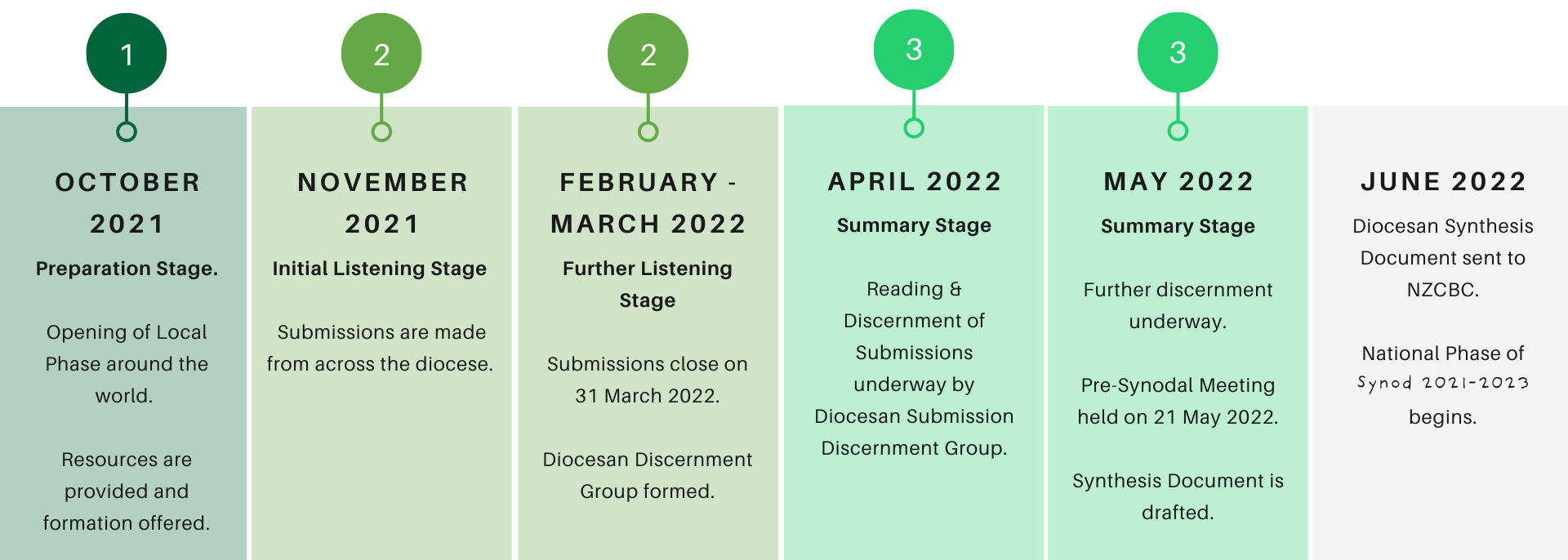
Local Pre-Synod Hui
The Pre-Synod Hui was held a fortnight prior to finalising the synthesis document and was a significant part of this synodal experience. The purpose of the hui was to come together to pray, listen, reflect and discern on themes that were emerging from the submissions. Due to restrictions on numbers, representatives were invited to this hui, which aimed to be a gathering of a representative cross-section of the people of the diocese.
Participants offered reflections on understandings of synodality and after being presented with the emerging themes, began to explore how the people of the diocese are being called to respond. Some of the practical suggestions that had emerged through the submissions were integrated into the day. This resulted in an experience of small group sharing opportunities, the use of both Māori language and cultural practice, tikanga, and concluded with an interactive celebration of the Eucharist. Overall, there was a strong sense of the Holy Spirit throughout the day.
LOCAL SYNOD RESOURCES
Collection of the various resources produced during the Listening Stages to enable participation in the synodal process.
NATIONAL PROCESS
The NZ Catholic Bishops Conference compiled a National Synod syntheses document from the diocesan phase of the Synod 2023 process and the national hui held in Wellington in June to synthesise the diocesan documents.
Six strong themes have emerged from the diocesan and national Synod processes undertaken in the Catholic Church of Aotearoa New Zealand – Inclusion, Gathering, Leadership, Education and Formation, Mission, and Synodality and Change.
The role of women, biculturalism, and abuse in the Church cut across those six themes.
STAGE TWO: CONTINENTAL PHASE
Aotearoa reflection and discernment on the Document
The Continental Stage for Oceania involved the countries and territories covered by the Bishops’ Conferences of New Zealand, Australia, Papua New Guinea, and Solomon Islands, and the Episcopal Conference(s) of the Pacific.
Aotearoa New Zealand then needed to carry out a discernment process on this document. The results of our discernment were integrated with similar documents from other Bishops’ Conferences of Oceania. The resulting draft was considered by the bishops of the region at the Assembly of the Federation of Bishops Conferences of Oceania, in Suva in February, which finalized a synthesis from Oceania to go to the Synod Office in March 2023.
The discernment process on the Document for the Continental Stage had to take place before 5 December, so that the New Zealand response could be ready by 22 December. Due to the tight timeframe, the process was limited to diocesan and national groups, and religious congregations. The Document for the Continental Stage was not a document to be amended, corrected, or enlarged, but a true guide for an ongoing discernment, fruit of listening to the People of God.
A group of individuals from various diocesan advisory bodies and areas were invited to participate in an online Spiritual Conversation session to reflect and discern about this DCS. These online sessions were facilitated by the diocese.
Continental Stage Background
Some 30 theologians, pastoral workers and bishops gathered from 22 September to 2 October at Frascati near Rome to draft the working document for the continental phase of the Synod. The document is referred to as the Document for the Continental Stage (DCS). It brings together the syntheses submitted by Bishops Conferences, religious orders, Catholic organizations, movements, dicasteries and others.
The Synod Office received 112 submissions from the 114 Bishops Conferences in the world which is unprecedented.
The DCS was released in Rome on 27 October. It was the subject of reflection and discernment in the continental gatherings. These gatherings then each produced their own document, which were used by the Synod Office to draft the working document for the October 2023 Synod Assembly.
Some continents were able to have ecclesial assemblies involving bishops, priests and lay people gathering together. In Oceania this was judged to be too expensive and difficult, so a different process was developed. To ensure that the response to the DCS was ecclesial and included substantial clergy, religious and lay input, there was a reflection and discernment process on the DCS in the dioceses of Oceania in February 2023. The responses were synthesised into one synthesis from each of the four Bishops Conferences.
The Oceania response was drafted by a writing and discernment group which met in Melbourne in January 2023. It was then prayerfully reviewed and submitted to the Synod Secretariat in Rome.
The Oceania Response is available here.
The Catholic bishops of Oceania say their people’s reflections for the global Synod of Bishops for a Synodal Church left them feeling “peace and joy”, but also called them to be prophetic and ready to “model ourselves on the love we proclaim”.
The bishops met in Fiji in February 2023 for the quadrennial assembly of the Federation of Catholic Bishops Conferences of Oceania. They spent part of that gathering considering the region’s response to the Synod’s Working Document for the Continental Stage, titled Enlarge the Space of Your Tent.
The Oceania response was drafted by a writing and discernment group, which synthesised reports from the four bishops conferences and the local Eastern Catholic Churches. Listen to what they had to say on their experience here.
In a context of prayer and contemplation, the bishops reviewed and refined that document, which the FCBCO’s executive council recently approved and submitted to the Synod Secretariat in Rome. This document has now been published.
STAGE THREE: UNIVERSAL PHASE
The Universal Phase of the Synod included two key Synodal Assemblies in Rome.
The first session was held in October 2023, and the second in October 2024.
FIRST SESSION
The XVI Ordinary General Assembly of the Synod of Bishops was held in Rome in October 2023. To prepare for this session, the working document Instrumenum Laboris was published on June 2023.
Find the document here, or watch the summary video below.

In the late afternoon of Saturday 28 October 2023, the members of the XVI Ordinary General Assembly of the Synod of Bishops adopted the Synthesis Report titled ‘A Synodal Church In Mission.’
Click here to view the full document, or have a read of the summary slides below.
Archbishop Paul Mart SM, Wairarapa parish Priest Fr Dennis Nacorda, and Auckland Vicar for Māori Manuel Beazley were invited to attend the Synod of Bishops in October 2023.
In March 2024 they held a Zoom session with a live audience, reflecting on their experience.
TOWARDS OCTOBER 2024
In February 2024, the General Secretariat of the Synod released a document titled ‘Towards October 2024′, which outlined the second assembly of the Synod.
In New Zealand, the Catholic Bishops put together a consultation document that focused on the synodal question, “How can we be a synodal church in mission?” All people throughout Aotearoa were encouraged to engage with the content presented in the sythesis report and submit their responses by the beginning of April. Representatives from the 6 Catholic Dioceses of Aotearoa New Zealand then gathered online to review the draft synthesis of the responses, collated by Anne Dickinson for the New Zealand Catholic Bishops Conference.
The final report of the 2024 consultation was sent to Rome in May 2024. Also titled ‘Towards October 2024′, it includes Catholic voices from around Aotearoa New Zealand.
SECOND SESSION
In July 2024, the Vatican published the Instrumentum Laboris (Working Document) for the Second Session of the Sixteenth Ordinary General Assembly of the Synod of Bishops, held in Rome in October. This document was based on national summaries provided to the General Secretariat by bishops’ conferences around the world, including one from the NZ Catholic Bishops Conference.
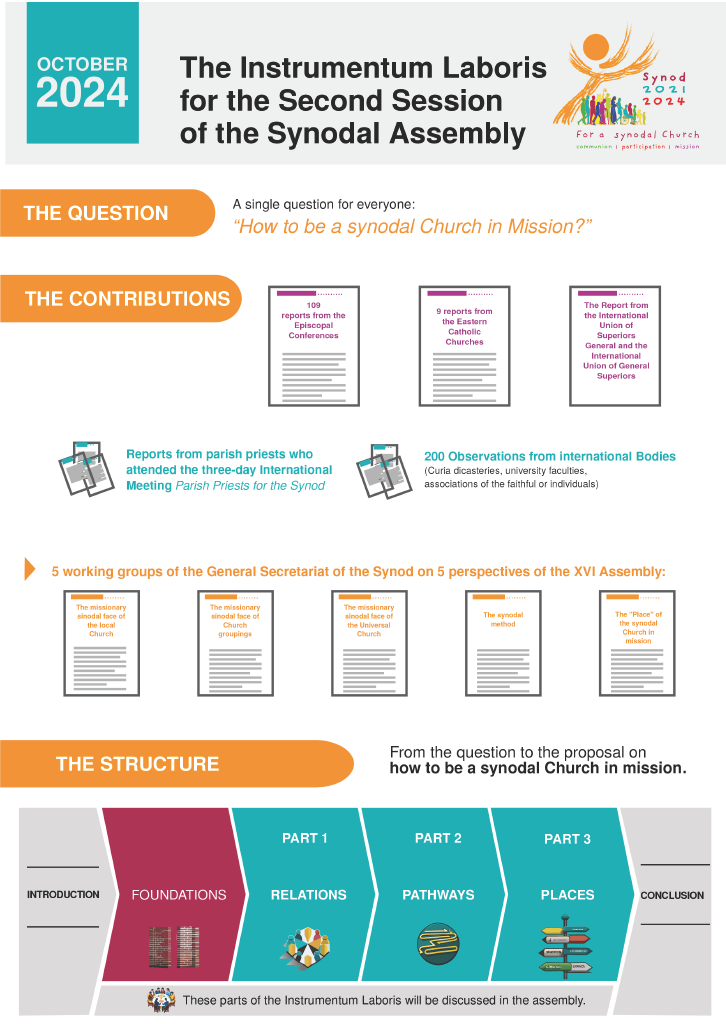
FINAL DOCUMENT
For a Synodal Church: Communion, Participation and Mission
The Synod’s second session was held on 2–27 October 2024, and concluded with the approval of its definitive text, endorsed by Pope Francis on 26 October.
Published by the Vatican on 30 December 2024, this document gathered three years of listening and discernment and connected each chapter to Gospel inspiration. Unusually, Pope Francis confirmed there would be no Apostolic Exhortation based on the final document; the document itself is part of his ordinary Magisterium.
SUMMARY OF THE FINAL DOCUMENT
The Final Document of the XVI Ordinary General Assembly of the Synod of Bishops gathers the fruits of a journey marked by listening to the People of God and by the discernment of Pastors. The whole Church, allowing itself to be enlightened by the Holy Spirit, was called to review its own experience and identify the steps to be taken to live communion, realise participation and promote the mission that Jesus Christ entrusted to the Church."
Accompanying note by the Holy Father Francis
Core Vision
The Synod affirms that synodality is a fundamental dimension of the Church’s identity. It calls for a Church that walks together—clergy, laity, and consecrated—listening to the Holy Spirit and one another, rooted in baptism and oriented toward mission.
Spiritual Conversion
Synodality begins as a spiritual attitude. The Church is invited to deepen prayer, discernment, humility, and openness to the Spirit, ensuring that reforms flow from faith rather than mere structural change.
Relational Conversion
The document urges renewed relationships within the Church and beyond—between men and women, generations, cultures, and with those on the margins. It emphasizes inclusion, equality, and healing of wounds, including those caused by abuse.
Procedural Conversion
Decision-making processes need reform to broaden participation and consultation, clarify roles of authority, and embed transparency and accountability. Regular parish, diocesan, and continental assemblies are encouraged.
Institutional Conversion
Structural changes include strengthening pastoral councils, revising canon law to reflect synodal principles, and ensuring financial transparency. Diocesan synods and participatory bodies should become standard practice.
Missionary Conversion
Synodality serves the Church’s mission of evangelization. The document calls for outreach to the poor, engagement with digital culture, promotion of justice and care for creation, and deeper ecumenical and interreligious dialogue.
Key Emphases
- Role of Women: Greater leadership opportunities and continued discernment on diaconal ministry.
- Lay Ministries: Expanded and stable roles in listening, accompaniment, and pastoral service.
- Formation: Shared formation for laity, clergy, and consecrated persons focused on collaboration and safeguarding.
- Accountability: Mandatory financial and pastoral reporting, evaluation of ministries, and a culture of transparency.
- Unity in Diversity: Respect for local contexts while fostering global communion and ecumenical collaboration.
IMPLEMENTATION PHASE
On 15 March 2025, the Vatican announced the start of the implementation phase for the Synod on Synodality, following the adoption of its Final Document in October 2024. This phase will run until October 2028 and aims to embed synodality into the life of the Church through concrete action.
Key Points:
- Accompaniment Process: Local Churches, bishops’ conferences, and ecclesial bodies are invited to engage in prayerful discernment and practical steps to apply the Synod’s proposals.
- Evaluation and Accountability: Structures will monitor progress, ensure transparency, and foster a culture of trust and healing.
- Formation and Participation: Emphasis on shared formation for clergy and laity, strengthening pastoral councils, and promoting inclusive decision-making.
- Global Communion: The process respects local contexts while maintaining unity across the universal Church.
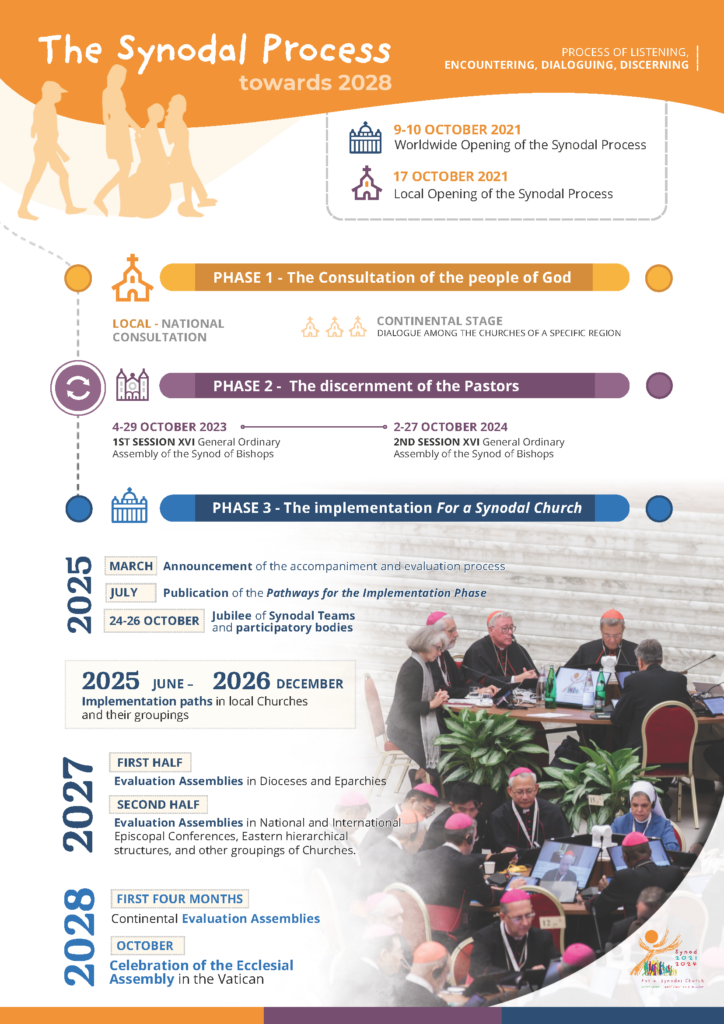
PATHWAYS FOR THE IMPLEMENTATION OF THE SYNOD
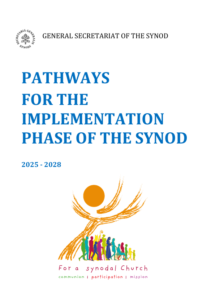 In July 2025, the Vatican released a document offering guidance on the latest stage of the global synodal process launched by Pope Francis in 2021. The document sets out what’s required of dioceses in the run-up to a 2028 Vatican ecclesial assembly approved by Pope Francis weeks before his death and continued now by Pope Leo XIV.
In July 2025, the Vatican released a document offering guidance on the latest stage of the global synodal process launched by Pope Francis in 2021. The document sets out what’s required of dioceses in the run-up to a 2028 Vatican ecclesial assembly approved by Pope Francis weeks before his death and continued now by Pope Leo XIV.
These Pathways, prepared by the General Secretariat of the Synod with the favourable opinion of its Ordinary Council and approved by the Holy Father Leo XIV, are part of the General Secretariat’s service of accompaniment during the implementation phase of the Synod. They have a twofold purpose. On the one hand, they aim to offer local Churches throughout the world a shared framework that will make it easier to walk together. On the other hand, they promote the dialogue that will lead the whole Church to the Ecclesial Assembly in October 2028, according to the following stages:
- June 2025 – December 2026: implementation activities in local Churches and their groupings;
- First semester of 2027: evaluation Assemblies in Dioceses and Eparchies;
- Second semester 2027: evaluation Assemblies in national and international Episcopal Conferences, Eastern hierarchical structures and in other groupings of Churches;
- First four months of 2028: continental evaluation Assemblies;
- October 2028: Ecclesial Assembly in the Vatican.
The text of Pathways looks at these main questions:
1. What is the implementation phase and what are its objectives?
2. Who will participate in the implementation phase? What are their tasks and responsibilities?
2.1. The responsibility of the diocesan or eparchial Bishop
2.2. The task of the synodal teams and participatory bodies
2.3. The role of the groupings of Churches
2.4. The service of the General Secretariat of the Synod
3. How to engage with the Final Document during the implementation phase?
3.1. Preserving the overall vision
3.2. Investing in concrete practices
4. What method and tools can help shape our path during the implementation phase?
4.1. Ecclesial discernment
4.2. A synodal approach to designing and accompanying processes
